Adrian Collins's Blog, page 24
April 4, 2025
A Blessing or a Curse: How Success Breeds Oversaturation
As a fan of fantasy and sci-fi, I am constantly dreaming up ideas of which stories will be adapted for the screen and creating the perfect cast in my head. It’s one of the joys of really loving something and caring about a product and feeling connected to a story. Whether it is the latest book or a new game, I’ll devour something and wonder what that story would be like if made into a film or TV series. Countless online communities do the same, sharing their ideas and rating each other’s opinions – it adds to the community aspect of a new product (although it can breed some negativity too!). There are so many incredible stories I want adapted and it feels as though just a tiny few make it to the screen which feels like a complete waste – but when something does make it on our screens and becomes popular, does it have a positive or negative effect for its fans and the genre?
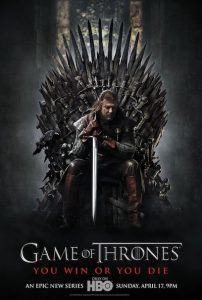 It’s all about money – we know that. TV and film companies will adapt things that they feel will be a hit and fantasy and sci-fi stories generally will end up needing large budgets which create a level of risk. They need a breakout hit to prove that there is a winning formula, but what happens next? Let’s take Game of Thrones as an example. A hugely popular book series A Song of Ice and Fire written by George RR Martin, there was no guarantee that the show would be successful. However, HBO backed the first season with money and marketing around the always incredible Sean Bean, knowing that he could draw in fantasy fans from Lord of the Rings following that trilogy becoming the most critically acclaimed of all time. Debuting in 2011, it redefined what television audiences expected from fantasy dramas and delivered a gritty, realistic series with political intrigue that draw in fantasy fans and newcomers alike. It became one of the most influential shows of the decade and naturally, everyone wanted to capitalise on its success. A wave of fantasy adaptions focusing on ‘gritty realism’ followed with the aim of finding ‘the next Game of Thrones’. Fantasy shows emerged from every streaming service and channel with varying degrees of success. The Wheel of Time finally arrived on our screens thanks to Amazon Prime which also bought the rights to Lord of the Rings for a monumental sum of money and produce The Rings of Power, a show that added a bit more grit and darkness to Middle-earth. A multitude of spin-offs in the world of Westeros were announced with many being dropped due to apparent quality issues whilst House of the Dragon and the upcoming A Knight of the Seven Kingdoms made it through. Even America’s Boy Scout and the world’s most well-known symbol of hope, Superman, took on a darker edge in the more grounded and gritty Man of Steel and follows ups Batman V Superman and The Justice League. Everything seemed to go darker and for fans of grimdark, this might sound like a great thing, but was it?
It’s all about money – we know that. TV and film companies will adapt things that they feel will be a hit and fantasy and sci-fi stories generally will end up needing large budgets which create a level of risk. They need a breakout hit to prove that there is a winning formula, but what happens next? Let’s take Game of Thrones as an example. A hugely popular book series A Song of Ice and Fire written by George RR Martin, there was no guarantee that the show would be successful. However, HBO backed the first season with money and marketing around the always incredible Sean Bean, knowing that he could draw in fantasy fans from Lord of the Rings following that trilogy becoming the most critically acclaimed of all time. Debuting in 2011, it redefined what television audiences expected from fantasy dramas and delivered a gritty, realistic series with political intrigue that draw in fantasy fans and newcomers alike. It became one of the most influential shows of the decade and naturally, everyone wanted to capitalise on its success. A wave of fantasy adaptions focusing on ‘gritty realism’ followed with the aim of finding ‘the next Game of Thrones’. Fantasy shows emerged from every streaming service and channel with varying degrees of success. The Wheel of Time finally arrived on our screens thanks to Amazon Prime which also bought the rights to Lord of the Rings for a monumental sum of money and produce The Rings of Power, a show that added a bit more grit and darkness to Middle-earth. A multitude of spin-offs in the world of Westeros were announced with many being dropped due to apparent quality issues whilst House of the Dragon and the upcoming A Knight of the Seven Kingdoms made it through. Even America’s Boy Scout and the world’s most well-known symbol of hope, Superman, took on a darker edge in the more grounded and gritty Man of Steel and follows ups Batman V Superman and The Justice League. Everything seemed to go darker and for fans of grimdark, this might sound like a great thing, but was it?
I want more fantasy out there. I want Joe Abercrombie’s First Law world to come to life on the big screen. I want to see Mark Lawrence’s Jorg be a bastard as I sit on the sofa knowing what is to come but being just as excited for how someone has adapted the incredible character. I really want Empire of a Vampire to blow people away with clever adaption of a world with Daysdeath and the Grail introduced to those who haven’t read the amazing book. But what I don’t want is countless medieval fantasy worlds trying to be ‘the next Game of Thrones’. Game of Thrones has done that and it was amazing (mostly). We don’t just need a grimdark aesthetic and high production values, we need more. We need carefully crafted stories by people who understand the source material and what makes them unique and loved by so many. If not, we end up with a market bloated with Game of Thrones rip-offs as companies vie for that same audience but with a lack of understanding of what made it such a hit in the first place.
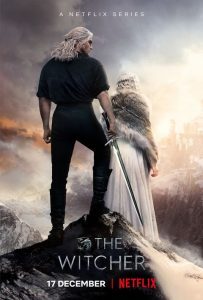 This brings me to The Witcher. Popular books. Wildly successful games (God I love The Witcher III: The Wild Hunt). Henry Cavill, a huge Witcher and Warhammer fan cast as the protagonist Geralt and a budget to allow for the fantasy elements to be pulled off effectively. What could go wrong? This had to be a sure fire hit. Cavill knew the source material better than most and he, and most of the cast, do amazingly well in the series from Netflix. But whilst the show is enjoyable, something is missing. Rumours spread from the set that the writers were mocking the source material and arguing with Cavill over the direction of the series and how closely it should link to the books and games and this eventually led to the star leaving. The Witcher had so much potential but instead, it is just an enjoyable but inconsistent series. Still, many people have watched it and production was then rushed on a prequel which definitely missed the mark and showed what happens when you’re trying to milk the cash cow. Animated efforts since have been more effective and allowed more creative freedom (Nightmare of the Wolf and Sirens of the Deep). I understand media being created to make money but I feel the oversaturation of the market following some success misses the point. Things are successful because they have a mix of things: a good story first and foremost, a creative team that understands the reason the story worked in the first place, and a dedication to craft something that will appeal to a wide audience without stripping the story of what makes it unique.
This brings me to The Witcher. Popular books. Wildly successful games (God I love The Witcher III: The Wild Hunt). Henry Cavill, a huge Witcher and Warhammer fan cast as the protagonist Geralt and a budget to allow for the fantasy elements to be pulled off effectively. What could go wrong? This had to be a sure fire hit. Cavill knew the source material better than most and he, and most of the cast, do amazingly well in the series from Netflix. But whilst the show is enjoyable, something is missing. Rumours spread from the set that the writers were mocking the source material and arguing with Cavill over the direction of the series and how closely it should link to the books and games and this eventually led to the star leaving. The Witcher had so much potential but instead, it is just an enjoyable but inconsistent series. Still, many people have watched it and production was then rushed on a prequel which definitely missed the mark and showed what happens when you’re trying to milk the cash cow. Animated efforts since have been more effective and allowed more creative freedom (Nightmare of the Wolf and Sirens of the Deep). I understand media being created to make money but I feel the oversaturation of the market following some success misses the point. Things are successful because they have a mix of things: a good story first and foremost, a creative team that understands the reason the story worked in the first place, and a dedication to craft something that will appeal to a wide audience without stripping the story of what makes it unique.
Competition can of course foster creativity and in the world of streaming giants, each company wants their own version of what is popular. On the other hand, excessive imitation can lead to stagnation with nothing standing out or feeling unique. Even in the superhero genre, it felt as though Marvel became too comfortable with their early success which was built on great stories with a creative team that cared (that’s how you make something like Guardians of the Galaxy a success). When they went into overdrive and began developing films at a faster rate, the quality dipped and is just now recovering as they pause and focus on quality instead of quantity. Audiences will feel overwhelmed if things feel too similar and there can be fatigue and disinterest, especially when the quality dips. It can devalue genres and make it harder for original works to break through.
It is all about innovation and not imitation. There is nothing wrong with being inspired by something successful but the key to longevity and success is not chasing trends and saturating the market with copycat works but in fostering new voices, narratives, and fresh techniques. Audiences crave originality. Two of the best modern directors, Robert Eggers (Nosferatu, The Northman) and Christopher Nolan (The Dark Knight, Interstellar, The Odyssey), don’t try to retread over old ground. Their films may have their fingerprints all over them with a similar style but they are all crafted as unique stories built with love and care and that is why they are so successful and critically acclaimed. Rather than asking, “How can we make the next Game of Thrones?” we need to ask “What’s the next great story we can tell?”. Perhaps then I will see Logen Ninefingers and Jorg delighting and disgusting audiences on the screen. Until then, I await patiently for something new in the grimdark landscape.
The post A Blessing or a Curse: How Success Breeds Oversaturation appeared first on Grimdark Magazine.
April 3, 2025
EXCLUSIVE: Cover Reveal for A Sword of Gold and Ruin by Anna Smith Spark
Anna Smith Spark is a lady who really needs no introduction to fans of grimdark. She is an awesome writer of dark fantasy and a great friend of ours here at Grimdark Magazine. After collaborating last year with Michael Fletcher for our novella In the Shadow of Their Dying, the Queen of Grimdark is back with her latest folk horror fantasy A Sword of Gold and Ruin. Anna told us that this sequel to A Sword of Bronze and Ashes is ‘darker and even stranger than the
first book’ and we cannot wait to read it.
A Sword of Gold and Ruin is a lyrical blend of epic myth and daily life. Kanda and her family are on a quest to rebuild the glory that was Roven. Mother and daughters stand together as a light against the darkness. But mother and daughters both have hands that are stained red with blood. They walk a path that is stranger and more beautiful than even Kanda dared imagine, bright with joy, bitter with grief. Ghosts and monsters dog their footsteps – but the greatest monsters lie in their hearts.
So, without further ado, here it is:
Exclusive Cover Reveal of A Sword of Gold and Ruin by Anna Smith SparkExclusive Excerpt from A Sword of Gold and Ruin by Anna Smith SparkNot only has Anna sent us the cover to share with you all, she’s also gifted us an exclusive extract to whet your appetites even more. A Sword of Gold and Ruin is first being published in hardback with a set of gorgeous sprayed edges, so not only will it be a great read it will look beautiful on your shelves too. Perfection.
Here’s our exclusive excerpt:
Chapter One
The crocuses were in bloom.
A gray sky, that gray that suggests rain and softened weather. The storms of winter are almost now the first spring rain. A bird was singing in a tree still bare, yet the song was calling a mate or singing that she had one, in the single note there repeated there was spring blossom and summer sun and hatching eggs. The ground was cold mud and bareness, yet from the mud with the snow’s melting fresh on it the crocuses were in bloom purple and white and yellow, and beneath the ground the world was waking to burst up green. And the bird flew low and brown with twigs in her beak to build her nest.
But the air was far colder than Kanda had expected, biting at her face and hands, stinging her throat as she sucked it down into her lungs. Stepping out of the door with her coat loose and unfastened, her face turned bright to the sky. The cold made her gasp. Pleasant, refreshing: the taste, the feel of the winter cold in her mouth stepping out from hearth smoke: that was a thing she loved. But the smell of the air, the light that streamed in pale through the hall’s high windows – they had made her think of warm days and warm sweet flower air and she had relaxed herself for the warmth on her face.
Almost unbalanced, walking in the biting cold feeling – knowing – that it was spring. The bird there singing, even if the trees were bare, knew it was spring. And the crocuses she waded through knew.
Winter is not a good time for fighting. And not a good time for burying the dead.
The earth is too cold in winter to bury the dead. Spring is the fitted time for these things.
From the slopes of the mountains before her on the far horizon, smoke was rising. The wind blew the wrong way for her to smell it. Thin columns. Many columns. Kanda put her hand on the hilt of her sword. More smoke rising on the horizon than would soon rise from the slopes of the mountains where she stood.
“Ah, it’s cold.” The voice made her almost jump. She turned. Laughed.
“If you insist on going out in your shirt, Gallyn.”
“Look, you can see my breath.” He huffed out into the gray air.
“No, you can’t.”
“No, you can’t. Bah.” He puffed out his cheeks, blew out like blowing a war horn. “It should be cold enough for that.”
Kanda looked at him. “Have you even been to sleep?”
“That’s for after all this, when the excitement’s died down. We fight, we celebrate, then we sleep.”
“Gallyn…we haven’t started fighting yet. This is still the boring bit.”
“We celebrate, we fight, we celebrate again…then we sleep. Bah, it really should be cold enough to see my breath.”
“Gallyn….” His face was such a boy’s face. So young. Celebrating for him almost meant cakes and games and running about. Kanda thought looking at him: why could our Lord not have made me as young as that? Her hair was red as fire, her skin was brown as earth, her eyes were blue as sweet deep water, on her brow she wore a circlet of bronze; out of good sown earth and wildfire and red autumn berries, the Lord of Roven had shaped her. But he had not, in his great wisdom, made her beautiful and young.
Gallyn, Great Leap, silver trout and green willow leaves, golden sand on summer beaches, the babble of a snowmelt river, dragonflies in a buzz of rainbowed wings. His helmet had a young stallion rearing in the dance as its crest.
“Go inside and put your cloak on before you catch a cold and miss the battle entirely,” Kanda said.
“A cold! A mere cold keep me, Lord Gallyn of the Six Swords of Roven, from fighting?”
“Yes, but…. Go inside and put your cloak on before you catch a cold and have to ride into battle with a sore snot-crusted nose beneath your helmet.”
Laughter. “That might bother Morren. But not me. However – it is far too cold to be without a cloak, yes.”
If it was Morren, Kanda thought, she would say now, “Are you…have you been drinking before the battle?’ and fret over him. But Gallyn skipped off back into the hall only young and foolish and in such high thoughtless good spirits. He shouted from inside the hall: “And sneeze so hard I almost fall off my horse mid-sword thrust! Spray snot all over the enemy even as I cut off his head!”
“Get on with you, Gallyn.” Ah, he was by far the best of them!
A trumpet rang from behind the hall. A long, mournful note.
Gallyn said, “Oh.” He came back out, cloaked now in shining white. His face was grave now. A boy’s face, shocked by war and death.
Kanda thought: our Lord of Roven in his wisdom made him young and innocent. Thus every time the battle ends and the dead are gathered, the cost of war comes new to him. Poor sweet Gallyn.
A bow shot’s distance, perhaps, or a little more, or as far, perhaps, as a man could run and not be winded, or as a horse could run for the sheer pleasure of its running, or as far as Gallyn could leap. Up to the crest of the hill on which the king’s hall was built, down the other side one hundred, two hundred, three hundred steps. There in the lee of the king’s hill a pool lay very clear, perfectly round and black like the eye of a prized milch cow, fringed in dark rushes. In the middle of the pool was a black rock. On the rock was a pyre. Birchwood that seemed to be not wood but white bleached bone against the black water and the black rock. On the pyre, quiet, almost sleeping, was a body wrapped in a fine red cloak.
The king’s hall, the king’s hill, the king’s pool in which the king must bathe on his crowning. The king’s cloak. The king’s son.
The horn blew its one terrible note. Comfortless, pitiless in its grief as the scream of a gull or a hawk. In answer, pitiless and comfortless also, the women raised the lament.
Mare. Mare.
Henket.
How young he was. How splendid.
So beautiful he was, and fierce, and strong.
Night has covered his eyes.
There is no joy in his face.
His arms are as stones in the empty field,
His eyes are as stones,
As stones, as cold ashes, his face.
Mare. Mare.
Henket.
Henket.
Mare, that is only despair. Mighty ceaseless quenchless all-consuming sorrow. Grief.
Henket, that is only death.
Read A Sword of Gold and Ruin by Anna Smith Spark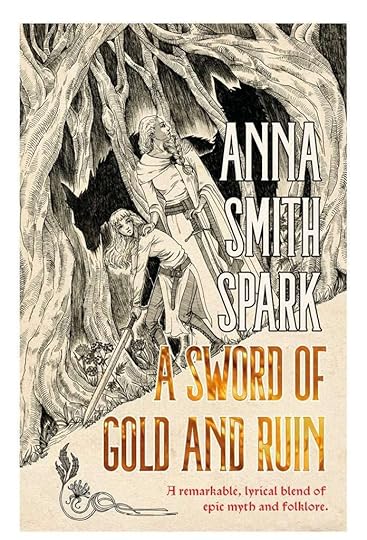 Read on Amazon
Read on AmazonThe post EXCLUSIVE: Cover Reveal for A Sword of Gold and Ruin by Anna Smith Spark appeared first on Grimdark Magazine.
April 2, 2025
REVIEW: The Sundowner’s Dance by Todd Keisling
Last Updated on April 4, 2025
Grief is a powerful theme in horror. So is getting old and facing that consistent dresser the Grim Reaper. And your neighbours being a bit creepy? Classic. Two-time Bram Stoker award-nominated author Todd Keisling’s retirement-community-gone-weird tale The Sundowner’s Dance from Shortwave, out April 22, combines these all into one poignant, heartfelt yet also gloriously sinister and freaky melange that creeps its way into your heart before exploding into a surreal, cosmic haze and asks the big questions about life, death, and, as we shall see, introverts.
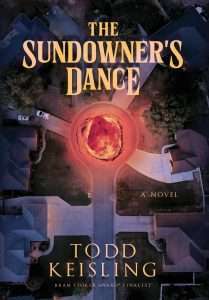 Our protagonist is Jerry Campbell, a grief-stricken elderly widower who, haunted by memories of his wife, buys a new home in a retirement community, Fairview Acres, for a fresh start. Although the neighbours seem nice enough, if a bit odd, there’s strange noises on his roof at night, a bleeding woman screaming about worms on his porch, and an overly friendly chairman of the community association who keeps inviting him to the endless and bizarrely energetic all-night parties. Oh and there’s a massive stone in the park that seems to be at the centre of everything.
Our protagonist is Jerry Campbell, a grief-stricken elderly widower who, haunted by memories of his wife, buys a new home in a retirement community, Fairview Acres, for a fresh start. Although the neighbours seem nice enough, if a bit odd, there’s strange noises on his roof at night, a bleeding woman screaming about worms on his porch, and an overly friendly chairman of the community association who keeps inviting him to the endless and bizarrely energetic all-night parties. Oh and there’s a massive stone in the park that seems to be at the centre of everything.
The set up to The Sundowner’s Dance is impressive. The first quarter does a delicate balance of grief horror—I found Jerry’s struggles to deal with the memories of his wife particularly moving, made more complex by his battle to deal with his anxiety in her absence—with neighbours-acting-weird suspense. That tingling, deep unease of these suburban-paradise-gone-wrong tales makes these early sections strong.
What proceeds from that is a strange ride of cosmic, grisly discoveries about neighbours and increasing high stakes on a cosmic level. Keisling loves a nightmarish tableau, and there’s some grotesque images that might put you off spaghetti for a few centuries.
But for me the most satisfying part of The Sundowner’s Dance was the unerring thematic commitment to the explorations of grief and aging. There is a strong sense overhanging this tale of the strange no-man’s land the elderly enter when their life partner dies and they must face an entirely new world, and new choices, even as their health fails and their years dwindle. We see one of these choices—challenge the concept of death and aging itself—play out in this book, and you’ll no doubt be stunned to find out it’s not as rosy as the brochure promises.
But impressively, there’s another meaty theme here distinct from growing old that really resonated with my millennial bones. Jerry is an introvert, and finds the never-ending peer pressure of his neighbours as wearying as any introvert reading this would find it (I got empathetic anxiety at some of his neighbours’ prodding.) There is a sense here of a group of people thinking they know best for the freaky introvert without ever seeking to try and understand them, and those of us who have felt this peer pressure from extroverts their whole life to “join in” will find Jerry’s plights here just as thematically satisfying as the revelations on death.
That said, this is ultimately a book about facing aging, grief, and death the right way, and to this end Keisling packs a hell of an ending that pulls no punches while being undoubtedly beautiful. The finish is strong on this one.
Overall, for all its retirement community mystery and cosmic creepiness, The Sundowner’s Dance is an elegiac reflection about one man’s confrontation with the pain that most of us will face and the fate that all of us will endure. A heartfelt creepfest that packs a punch.
Read The Sundowner’s Dance by Todd KeislingThe post REVIEW: The Sundowner’s Dance by Todd Keisling appeared first on Grimdark Magazine.
REVIEW: The Sundowner’s Dance by Todd Kiesling
Grief is a powerful theme in horror. So is getting old and facing that consistent dresser the Grim Reaper. And your neighbours being a bit creepy? Classic. Two-time Bram Stoker award-nominated author Todd Keisling’s retirement-community-gone-weird tale The Sundowner’s Dance from Shortwave, out April 22, combines these all into one poignant, heartfelt yet also gloriously sinister and freaky melange that creeps its way into your heart before exploding into a surreal, cosmic haze and asks the big questions about life, death, and, as we shall see, introverts.
 Our protagonist is Jerry Campbell, a grief-stricken elderly widower who, haunted by memories of his wife, buys a new home in a retirement community, Fairview Acres, for a fresh start. Although the neighbours seem nice enough, if a bit odd, there’s strange noises on his roof at night, a bleeding woman screaming about worms on his porch, and an overly friendly chairman of the community association who keeps inviting him to the endless and bizarrely energetic all-night parties. Oh and there’s a massive stone in the park that seems to be at the centre of everything.
Our protagonist is Jerry Campbell, a grief-stricken elderly widower who, haunted by memories of his wife, buys a new home in a retirement community, Fairview Acres, for a fresh start. Although the neighbours seem nice enough, if a bit odd, there’s strange noises on his roof at night, a bleeding woman screaming about worms on his porch, and an overly friendly chairman of the community association who keeps inviting him to the endless and bizarrely energetic all-night parties. Oh and there’s a massive stone in the park that seems to be at the centre of everything.
The set up to The Sundowner’s Dance is impressive. The first quarter does a delicate balance of grief horror—I found Jerry’s struggles to deal with the memories of his wife particularly moving, made more complex by his battle to deal with his anxiety in her absence—with neighbours-acting-weird suspense. That tingling, deep unease of these suburban-paradise-gone-wrong tales makes these early sections strong.
What proceeds from that is a strange ride of cosmic, grisly discoveries about neighbours and increasing high stakes on a cosmic level. Kiesling loves a nightmarish tableau, and there’s some grotesque images that might put you off spaghetti for a few centuries.
But for me the most satisfying part of The Sundowner’s Dance was the unerring thematic commitment to the explorations of grief and aging. There is a strong sense overhanging this tale of the strange no-man’s land the elderly enter when their life partner dies and they must face an entirely new world, and new choices, even as their health fails and their years dwindle. We see one of these choices—challenge the concept of death and aging itself—play out in this book, and you’ll no doubt be stunned to find out it’s not as rosy as the brochure promises.
But impressively, there’s another meaty theme here distinct from growing old that really resonated with my millennial bones. Jerry is an introvert, and finds the never-ending peer pressure of his neighbours as wearying as any introvert reading this would find it (I got empathetic anxiety at some of his neighbours’ prodding.) There is a sense here of a group of people thinking they know best for the freaky introvert without ever seeking to try and understand them, and those of us who have felt this peer pressure from extroverts their whole life to “join in” will find Jerry’s plights here just as thematically satisfying as the revelations on death.
That said, this is ultimately a book about facing aging, grief, and death the right way, and to this end Keisling packs a hell of an ending that pulls no punches while being undoubtedly beautiful. The finish is strong on this one.
Overall, for all its retirement community mystery and cosmic creepiness, The Sundowner’s Dance is an elegiac reflection about one man’s confrontation with the pain that most of us will face and the fate that all of us will endure. A heartfelt creepfest that packs a punch.
Read The Sundowner’s Dance by Todd KieslingThe post REVIEW: The Sundowner’s Dance by Todd Kiesling appeared first on Grimdark Magazine.
April 1, 2025
REVIEW: Clockwork Boys by T. Kingfisher
First published in 2017, the novella Clockwork Boys by Hugo and Nebula award-winning writer T. Kingfisher has recently been given a rerelease by the team at Titan Books. The second novel in the Clocktaur War series, Wonder Engine, will get the same treatment in the Spring of 2026. I am a massive T. Kingfisher fan and adore her cute and creepy novellas, so I was very excited to get my hands on Clockwork Boys.
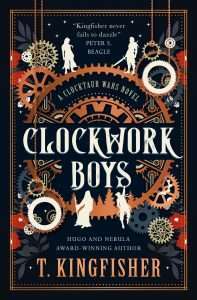 In Clockwork Boys, we follow a paladin, an assassin, a forger, and a scholar on a quest. It is a tried and tested format of epic stories, but rather than being on this mission for the good of their hearts, this band of misfits is there because they have no other choice. Charged with treason and sporting magical tattoos that will literally eat them alive if they do not try their best to succeed forger Slate, assassin Brenner, disgraced knight Caliban, and the very reluctant Edmund, the scholar must travel across the border, deep into enemy territory, to discover how the deadly clockwork boys are made and how they can be killed. If they succeed, they will all receive pardons; it’s a shame that no one expects them to.
In Clockwork Boys, we follow a paladin, an assassin, a forger, and a scholar on a quest. It is a tried and tested format of epic stories, but rather than being on this mission for the good of their hearts, this band of misfits is there because they have no other choice. Charged with treason and sporting magical tattoos that will literally eat them alive if they do not try their best to succeed forger Slate, assassin Brenner, disgraced knight Caliban, and the very reluctant Edmund, the scholar must travel across the border, deep into enemy territory, to discover how the deadly clockwork boys are made and how they can be killed. If they succeed, they will all receive pardons; it’s a shame that no one expects them to.
Clockwork Boys is a darkly comic story, and the slightly broken group of eccentric characters was endearing. But as much as I really really wanted to have a great time reading this novella, it missed the mark for me. Which I am genuinely very sad about, as T. Kingfisher is one of my favourite authors. I think the darkest of gallows humour and light horror, which I loved in novellas like Nettle and Bone or A House with Good Bones, wasn’t quite as big a part of this story, and Clockwork Boys is more of a traditional adventure or heist fantasy.
However, Clockwork Boys was still an okay read. It didn’t blow my proverbial socks off, but I didn’t abandon it in frustration. I enjoyed the characters, particularly Slate, and Kingfisher remains very good at creating normal, adult women in her writing who feel very real. There was humour, and a fair amount of witty banter, and the story flowed well for a short novel. Clockwork Boys covers a journey to a place and sets up the reader for the second novel, and it does its job.
I went into Clockwork Boys expecting the wrong thing; I am used to Kingfisher creating superb dark novellas and wrongly presumed that this story would be more of the same. This is not a light and airy swashbuckling tale; it has some dark elements, like the demon rotting inside Caliban, and it subverts many of the quest narratives’ tropes, but it wasn’t the sort of story I was expecting to read. Kingfisher discusses her motivations for writing Clockwork Boys in the afterward at the end of the novella and explains her inspirations of games like the Neverwinter Nights or Dragon Age, if reader are more familiar with these games and the stories of fantasy paladins they will likely enjoy Clockwork Boys more than I did.
Thank you to T. Kingfisher and the team at Titan Books for sending us a copy of Clockwork Boys.
Read Clockwork Boys by T. KingfisherThe post REVIEW: Clockwork Boys by T. Kingfisher appeared first on Grimdark Magazine.
March 31, 2025
REVIEW: Of Darkness and Light by Ryan Cahill
Book two in ‘The Bound and the Broken’ series, Of Darkness and Light, begins with a battle. You are instantly thrown back into Cahill’s world with a swift, bloody slap to the face that will draw you in and submerge you in this desperate fight once more. At the end of book one, Of Blood and Fire, Calen and Dann had travelled with Aeson, Dahlen and Erik to the free city of Belduar, a city that had survived countless sieges over the years and was famously impenetrable. Until now. Shady goings on lead to the Empire’s army breaking into the city followed closely by three Dragonguard, content to melt anyone and anything in their path.
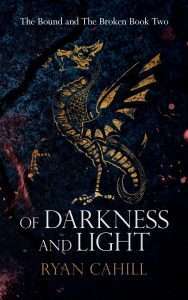 In fleeing Belduar to the Dwarven freehold under the mountain, Calen stretches his abilities with the Spark (the in-world magic system), nearly burning himself out (literally) to aid the retreat and escape. As some of the last to leave Belduar, and in the chaos of such brutal defeat, our core set of characters become split. For the bulk of the story in Of Darkness and Light, our original trio – Calen, Dann and Rist – are all separated, as are the father and sons, Aeson, Dahlen and Erik. This allows Cahill to explore and develop these characters as individuals following on from Of Blood and Fire’s introduction to them as a group.
In fleeing Belduar to the Dwarven freehold under the mountain, Calen stretches his abilities with the Spark (the in-world magic system), nearly burning himself out (literally) to aid the retreat and escape. As some of the last to leave Belduar, and in the chaos of such brutal defeat, our core set of characters become split. For the bulk of the story in Of Darkness and Light, our original trio – Calen, Dann and Rist – are all separated, as are the father and sons, Aeson, Dahlen and Erik. This allows Cahill to explore and develop these characters as individuals following on from Of Blood and Fire’s introduction to them as a group.
Elsewhere, Calen’s sister Ella remains unaware of her family’s fate and is unknowingly accompanied by the man who orchestrated their deaths – Farda. Although she has wolfpine Faenir at her side, Ella’s journey is not easy and her safety is not guaranteed. As they travel, we also get insight into Farda’s past and character – a former Draleid with an obsessive reliance on a coin toss to decide the fate of those around him.
We are also introduced to Dayne, an eldest son returning to Valtara – the land of his family – following many years in exile hunting down those responsible for the murder of his parents and the immolation of countless lives of his countrymen. He returns to a nest of political machinations and treachery that sees his younger brother and sister at the heart of it. Dayne has aligned himself with Aeson for the coming war, but can he free Valtara and secure his position first?
Of Darkness and Light is a significant step up from Of Blood and Fire in terms of page count, character development, intrigue, grimness and authorial skill. There is a lot going on but at no point does it feel overwhelming or unmanageable. Characters that didn’t see much focus in book 1 are given the chance to grow and shine. There’s also expert exploration of the mental toll violence and war will take on someone; the pressures of leadership and the different choices we make under stress. Adding a level of fallibility to heroic characters that makes them all the more relatable and engaging.
Where Of Blood and Fire introduces us to the story and promises it will be epic, Of Darkness and Light starts to peel back the curtain and show us where we’re heading. The scope and potential expands through this book and hints at much, much more than you may have originally thought. It grows alongside Valerys, the ice-white dragon, and keeps hinting at even greater heights while still maintaining an action-packed, well-written story for the immediate moment. This is an excellent second instalment and the series continues to impress.
Read Of Darkness and Light by Ryan CahillThe post REVIEW: Of Darkness and Light by Ryan Cahill appeared first on Grimdark Magazine.
March 30, 2025
EXCLUSIVE: Cover Reveal for Vanguard Strike by Jarom Strong
It is awesome to be able to champion new voices in the Sci-Fi / Fantasy world, and being able to bring you all the cover and an excerpt from the debut release of Jarom Strong’s action packed space opera Vanguard Strike is a great feeling. Vanguard Strike is a thrilling story packed with tension, intrigue and hard hitting action.
Here’s why Jarom himself thinks Vanguard Strike would appeal to Grimdark Magazine readers:
“As a teenager, I was introduced to a Warhammer 40k card game called Space Hulk: Death Angel. The premise is simple—the players control a squad of space marines traversing a decrepit space station while battling hordes of aliens—but the atmosphere of the game has stuck with me ever since. The claustrophobia of navigating an endless maze of tight corridors where any corner could hide death. The mounting fear as your companions are picked off one by one. The desperation as the swarm of ravenous monsters closes around you and death seems certain…
Those emotions are what eventually turned into my debut novel, Vanguard Strike, and I can’t imagine a better place to reveal it than here at Grimdark Magazine. If you enjoy the power armor-clad space-marines of Warhammer 40k or the heart-pounding claustrophobia of the Alien franchise, you’re who I had in mind when I wrote this book. It’s got terrifying monsters, brutally intense combat and morally complex characters, all set against a bleakly dystopian vision of humanity’s future full of secretive corporations, oppressive governments, and vengeful revolutionaries. Beneath all of that, Vanguard Strike is a story about one man’s bloody journey to overcome grief, find redemption, and seize control of his own fate… or die trying. So if that sounds like your cup of trauma, by all means, venture into the dark with me and pre-purchase Vanguard Strike today.”
And the cover, is absolutely BANGING. Exactly the kind of thing that would make me pick it out from a bookshelf and check it out.
Cover reveal for Vanguard Strike
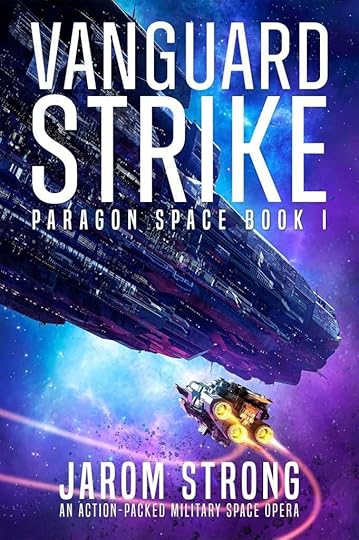
INDEPENDENT WORLD OF BRAHMA
S I X T E E N Y E A R S AG O
It’s amazing how bored one can be in the middle of a warzone.
I glanced up as I heard the familiar whistle of a Scourge rocket, tracing its flaring arc over our heads and down into the middle of a huddled mass of frightened Paragon grunts maybe thirty meters up range from us. Poor bastards. No armor or ordnance shields for them. The lucky ones died instantly. The rest of them started screaming, their cries mingling with the cacophony of the battle‐field. If I hadn’t seen a hundred scenes just like it, it might have been shocking to see. Instead, I found myself wondering idly what quiet corner of the galaxy they’d been dragged from, only to die here on the outskirts of… I frowned. Well, damn me if I couldn’t even remember the name of the city we were invading. Brahmians had strange old earth names for their cities. Gharseva, I think. The capital of the Planetary Governance of Brahma.
Pretty place—or it looked like it had been before we got here. Rolling green hills now turned brown and red, charming country‐side farm structures reduced to charred shells. A few weeks ago, sitting where I was now, you would probably have been listening to the sounds of farm animals braying, children laughing, and the occasional spacecraft taking off or landing from the nearby city. Today, though, all I could hear was the familiar lullaby of war: screams of pain, bullets and rockets whistling as they rushed to their targets, fightercraft screaming through the sky as they hurled ordnance down upon the enemy.
Nadus looked up from the small digital book he’d been reading. There was something amusing about the sight of the tiny device clutched between the bulky fingers of his armored Jericho CES-2 exosuit. “What was that, Lax?”
“How far out does SkyCom say we are?” I repeated.
Nadus shook his head. “No word yet from on high. But you can bet when it comes they’ll want us in hot, so get ready to have your strings yanked.”
The rest of the Vanguards grumbled their agreement and I nodded along with them. That was how it always was with
SkyCom. A long, uninterested silence, and then suddenly they wanted you in there yesterday. How the hell had the Paragon managed to conquer the entire damn galaxy with a bunch of bumbling idiots for commanders?
I knew the answer, of course. And it had nothing to do with SkyCom. Nothing to do with the rich pricks in suits giving the orders. It was guys like us. Vanguards. Plucked from our homes as children, stuffed full of cybernetic and biological enhancements, wrapped in a suit of near indestructible armor, and then tossed out onto the battlefield.
Puppets. That was what the rest of the grunts called us. Far as they were concerned, we were mindless killing machines dangling by the Paragon’s chemical strings. For a moment, I felt a surge of anger. You’d think I’d have learned to suppress that by now. After all, I’d been doing this for what… twelve years? Twelve years since Pa had dropped me off at the Vanguard recruiting station for a handful of credits. The thought still pissed me off. Enough so that it must have tripped my regulator. I heard a hissing sound and felt a sudden surge of calm as my exo shot a small dosage of frigicerin into my system. Stay cool, was the unspoken message, the proverbial string pulling me back into line. It’s not fighting time yet.
“Badger Green Seven,” a female voice suddenly said over the comms. “Prepare to move to designated co-ordinates. Expect both human and bioweapon resistance.”
“Ah, hell,” I muttered, glancing down as an orange dot appeared on the minimap of my exo’s wrist computer. Even
through the recently administered frigicerin, I felt a chill run down my spine. Bioweapon was a laughably reductive term, one the Paragon used to make their monstrosities seem like the sort of weapon a respectable, civilized organization could deploy in good conscience.
Everybody else called them rippers.
“They already dropped them?” Nadus muttered, hefting his standard-issue Jackhammer rifle and checking the chamber. The gun was almost a meter and a half long with an industrial, box-like shape to it. Between the size of the rifle and the massive ammo drum attached to the bottom of it, it was far too heavy for anyone to wield without the assistance of the powered exosuits we wore. “Paragon is getting more and more trigger-happy with the rippers.”
I rose to my feet, my exo giving a mechanical whir as I did so, and slung my own Jackhammer over my shoulder. “Same story as always. SkyCom makes the mess, we clean it up.”
I heard a slight whimpering sound and turned to see Rafe staring at his minimap. I could hear his breathing—hot and heavy and scared. I fought back a chuckle. “You’ll be alright, rookie. Just give a few seconds for the coolant to hit.”
He looked up at me. Damn, but he reminded me of myself back when I’d first been pulled out of the factory. Looking almost as if he was wearing somebody else’s body and it was a few sizes too big for him. “Just stay close to us,” I said. “We’ll make sure you come through this in one piece.”
He nodded. Then his eyes suddenly went slightly glassy. That’d be the frigicerin kicking in. It took some getting used to. It was a violating feeling, knowing that the Paragon could just reach into your brain and switch your emotions on and off. Soothing you when your mind was screaming that you should be scared. Riling you up when all you wanted to do was find a rock to hide under. It took a while to stop fighting it. But you did stop… eventually. It was only a matter of time until you realized you belonged to the Vanguard. To the Paragon. If not in heart, then at least in mind and body.
Another rocket whistled overhead. This one hit closer, spraying us with chunks of debris—mostly dirt, with a few chunks of corpse thrown in.
With a thought, I triggered my neurointerface and commanded my visor to close. Two inches of hardened steel
lowered over my face with a hiss, sealing me into my exo’s helmet. A moment later, the darkness distorted into sight as my exo projected my surroundings directly to my brain. I looked around. The rest of the squad had visored up as well, their faces hidden behind blank, expressionless sheets of armor, identifiable only by the ID numbers printed on their chests, the info provided by my suit’s HUD, and the occasional hand-painted images and slogans slathered across shoulder pauldrons. Travern had a crude image of an attractive woman on his, while Vint’s said RIPPER BAIT in bold lettering.
I wondered idly what it must be like to be on the receiving end of a Vanguard assault. Faceless, merciless, nearly unkillable creatures of metal and flesh surging towards you. I felt a twinge of pity for the enemy. They hadn’t asked for this. They probably just wanted to sit around and… I don’t know, do whatever it was they did on this little green planet of theirs. And now, because they dared resist the Paragon’s benevolent rule, we were going to kill them—that is, everyone the rippers didn’t kill first.
“Badger Green Seven,” the voice in the comms said. “Go.”
I took a deep breath. I knew what was coming. “See you on the other end,” I said to Nadus. He nodded, bracing himself in the same way I was.
Rafe peered around the corner of the ruined structure we’d been taking shelter behind, then jerked back as a bullet slammed into his visor with a loud metallic thud. The round bounced harm‐ lessly away, but it took a lot more experience than Rafe had to just shrug off a bullet to the face. “It’s too hot,” he gasped, swatting at his faceplate as if the bullet were a bug trying to sting him. “We can’t. It’s too—”
The words choked in his mouth, and he jolted up straight. I felt it too: a sudden rush of heat and fury in my veins as somebody sitting at a desk in a battlecruiser thousands of meters above us hit a button, sending a rush of ignicerin through our systems.
“Badger Green Seven,” the voice in the comms said again.
“GO.”
Read Vanguard Strike by Jarom StrongThe post EXCLUSIVE: Cover Reveal for Vanguard Strike by Jarom Strong appeared first on Grimdark Magazine.
March 29, 2025
REVIEW: Cello’s Gate by Maurice Africh
Well, I don’t know what I was expecting from a sci-fantasy following sky pirates going on a fool’s quest of a treasure hunt, but Cello’s Gate truly was the wickedly wild and uniquely imaginative adventure I didn’t know I needed in my life. It’s epic yet intimate, dark yet light-hearted, playful yet emotional, and it’s got a fun factor that just soars higher than the sky. Ghandammit frens, this is how you write one hell of a debut!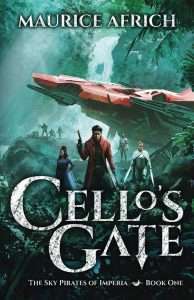 Okay so Cello’s Gate is really one of those books that just hits the ground running and never lets up. And while I am usually not the type of reader who likes to be thrown straight into the action, Africh just made it work oh so well. When we first meet our motley crew of loveable rogues, they are mid-heist, which not only instantly set the stakes and tension sky-high, but which also showcased how this diverse cast of characters works together like an oiled machine as everyone’s unique skills are put on full display.
Okay so Cello’s Gate is really one of those books that just hits the ground running and never lets up. And while I am usually not the type of reader who likes to be thrown straight into the action, Africh just made it work oh so well. When we first meet our motley crew of loveable rogues, they are mid-heist, which not only instantly set the stakes and tension sky-high, but which also showcased how this diverse cast of characters works together like an oiled machine as everyone’s unique skills are put on full display.
And so, the sturdy foundation for this absolute romp of an adventure is laid. From the very first page, I totally believed that the charming captain Grey and his ragtag crew would be able to pull off the impossible. So when the immortal daughter of the infamous Archgovernor tasks them with a treasure hunt to steal the Stones of Indigo, which are widely believed to be nothing but pure myth, in return for a bounty that sounds too good to be true? Let’s go baby, we got this, I am IN.
From the very first page, I felt like I was part of this crew; they are my frens, whether they know it or not. Captain Grey immediately captured my heart with his snarky attitude and amusing swagger, but the main reason why I fell head over heels in love with him is because he is not afraid to show his softer, vulnerable side or to admit that he was wrong when things go sideways. The man truly has a heart of gold, and seeing how deeply he cared for his crew and trusted blindly in their abilities just made me feel all the feels.
Though as big a presence as he is on the page, he somehow never overshadowed all the other intriguing and endearing characters who each have their own important role to play in Cello’s Gate. I honestly couldn’t pick a favourite character if I had to (okay lies, it’s probably my girl Dot), and I just loved unpacking everyone’s own emotional baggage throughout all these wild trials and tribulations. I personally loved the balance between the light-hearted banter, soul-stirring introspection, emotionally impactful conversations, and bursts of exhilarating (and often horrifying) action, which all really built up that deep emotional investment and made me fully feel and believe the stakes. Also, do not get me started on the found family vibes; just perfect, no notes.
Now, I do have to admit that the enigmatic big baddie of the story maybe felt a bit underdeveloped compared to the main cast, but I honestly didn’t mind that too much. See, I was just along for the wild ride, and the captivating present tense narration combined with the irresistible air of mystery and intrigue had me so deeply immersed that I honestly felt like I was living and breathing this story myself. Especially once we reached the mysterious abandoned island (which cleverly cancels out all tech), I was just glued to the page, and the section in the maze-like catacombs where everyone got tragically separated had my anxiety and claustrophobia running wild in all the best ways.
Plus, this future (queer-normative!) sci-fantasy world is just SO COOL! Like, not only does it have a fascinating detailed history, rich lore, tense political landscape, and unique flora and fauna, but it’s also inhabited by sky pirates in spaceships, enigmatic immortal baddies, powerful mystics, honourable sword wielding knights, and gunslinging guardians. Africh’s wild imagination just continued to surprise me with each new turn of the page, and I absolutely loved how he was able to capture and maintain that mystical fantasy vibe I so adore while also bringing in so many excitingly fresh modern tech elements.
While Cello’s Gate is truly unlike anything I have ever read, I think especially fans of Django Wexler’s Burningblade & Silvereye series, Scott Lynch’s The Lies of Locke Lamora, and Tamsyn Muir’s The Locked Tomb series will find so much to love here. There truly wasn’t a single dull moment in Cello’s Gate for me, and the diabolical twists and turns during the heart pounding ending would’ve made me fly straight into book 2 if that had been available. Honestly, forget about the Ghandamned mythical Stones, this book itself was the true treasure all along.
Thank you to the author for providing me with an eARC in exchange for an honest review. All opinions are my own.
The post REVIEW: Cello’s Gate by Maurice Africh appeared first on Grimdark Magazine.
March 28, 2025
REVIEW: Double-Edged Sword & Sorcery by Brackenbury Books
Sword and sorcery lives on, and it cuts a bloody swath through two Mongol-inspired novellas, masterfully collected in Double-Edged Sword & Sorcery by Brackenbury Books. If your only brushes with sword and sorcery (hereafter called S&S) are Conan the Barbarian and Red Sonja tales and you want something a little bit different, Double-Edged Sword & Sorcery might be the excellent shakeup you need. Contained within is Waste Flowers by Bryn Hammond: a story about Goatskin the Nomad, a warrior leading a caravan of merchants through the dangerous Gobi desert, as well as Walls of Shira Yulun by Dariel R.A. Quiogue, where the warrior Orhan Timur tries to survive a deadly siege in a city seeking his death. Both narratives offer different flavors of S&S, but both are packaged in one neat little book.
 Waste Flowers is a contemplative story with mystery and adventure at the heart of the narrative. Goatskin is an interesting character to follow. She’s a highly competent warrior who can survive even in the harshest conditions, but her thoughtful, philosophical moments make her stand out. Conan she is not, but Goatskin is a different sort of S&S hero, one that breathes new life into the genre.
Waste Flowers is a contemplative story with mystery and adventure at the heart of the narrative. Goatskin is an interesting character to follow. She’s a highly competent warrior who can survive even in the harshest conditions, but her thoughtful, philosophical moments make her stand out. Conan she is not, but Goatskin is a different sort of S&S hero, one that breathes new life into the genre.
Alternatively, in Walls of Shira Yulun by Dariel R.A. Quioque, the action picks up heavily. Orhan Timur seeks an old teacher of his as he is chased by an old enemy, a rival khan he used to grow up with. Orhan gets himself involved in a classic city siege, offering up loads of moments of sword slashing and blood splattering goodness. Orhan’s story is a whirlwind, and, much like the warrior himself, Walls certainly delivers on that promise of classic S&S while also elevating the genre to new and interesting heights.
Both are collected in an impressive volume that makes some strange formatting decisions. A copy of Double-Edge Sword & Sorcery has each story printed on opposite sides, allowing the reader to flip (sometimes physically) to whichever story strikes their fancy first. The artwork on both covers is gorgeous (and, as an unrelated aside, it reminds me of collecting both Pokémon Red and Blue games as a youth). Double-Edged Sword & Sorcery is a fascinating product, one that brings to mind classic S&S mass market paperbacks. Each novella is exciting and whip-quick, offering up two different perspectives on heroic Mongol-inspired fantasy, ones with deep ideological ponderings and rushes of action that left me wanting more. Fans of fast and bloody battles will love both tales.
Double-Edged Sword & Sorcery publisher Brackenbury Books is also the home of its magazine New Edge Sword & Sorcery, which publishes more S&S stories (some starring Goatskin and Orhan Timur) and hopes to bring new life, new voices, and a positive fan community into an exciting genre that has woefully taken a back seat in some corners of the fantasy landscape.
As of this writing, Double-Edged Sword & Sorcery is up for pre-order on BackerKit and will launch in April.
The post REVIEW: Double-Edged Sword & Sorcery by Brackenbury Books appeared first on Grimdark Magazine.
March 27, 2025
REVIEW: A Pocket of Lies by R.A. Sandpiper
If you thought fantasy romance was all sickly sweet cuddles and kisses, then R.A. Sandpiper is here to prove you wrong in A Pocket of Lies. Filled with cutthroat schemes, brutal fights, electrifying tension, and deadly deals, this fast-paced grimdark fantasy romance is an absolute gem of an emotional rollercoaster from start to finish.
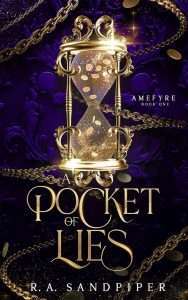 Okay so if you ever feel like your life is utter shit, just read A Pocket of Lies and remember that Suri is probably having it way worse than you are. After our lovely little spitfire of a thief suffers a very humiliating robbery, she goes into full-on revenge mode and decides to abduct and impersonate a foreign princess at the royal ball. Except, her crazy con soon goes absolutely tits up, which ends up leading to her exile into the cursed wastelands on a deadly mission to assassinate the dark and notorious Fae lord Kol. And that, my friends, is only the start of this glorious trainwreck of an adventure.
Okay so if you ever feel like your life is utter shit, just read A Pocket of Lies and remember that Suri is probably having it way worse than you are. After our lovely little spitfire of a thief suffers a very humiliating robbery, she goes into full-on revenge mode and decides to abduct and impersonate a foreign princess at the royal ball. Except, her crazy con soon goes absolutely tits up, which ends up leading to her exile into the cursed wastelands on a deadly mission to assassinate the dark and notorious Fae lord Kol. And that, my friends, is only the start of this glorious trainwreck of an adventure.
Now, if there is one thing I love in books, it’s stabby women who can hold a grudge, and that is Suri to a T. Did I want to shake and strangle her for her incredibly rash and impulsive actions sometimes? Oh yes, I sure did, but that level of relatable messiness only made me love her more. She really is the universe’s punching bag for the entirety of A Pocket of Lies, and I loved seeing her stubbornly fight and bluff her way through all the brutal trials and tribulations. Plus, she also has this mysterious menacing voice in her head that made her even more compelling to follow; never enough emotional inner turmoil, if you ask me.
In a way, I almost think she was a bit too much of an intense whirlwind of loud personality, as I personally felt like the side characters fell a little flat compared to her. That said, I really enjoyed seeing her navigate all the webs of schemes that she gets entangled in, and I was absolutely eating up the tension between her and literally every other character she met on this hellish journey. Especially her interactions with Silla, Rasel and Kol had me in an absolute chokehold, and the knife-sharp banter had me grinning and chuckling the entire way through.
Despite that bloody high fun factor, I think A Pocket of Lies is one of those reads that you need to pay close attention to, not only because Suri somehow manages to stumble from one disaster into the next one faster than you can blink, but also because the plot and lore (hello meddling gods!) get impressively complex the deeper in you get. And as much as I enjoyed that utterly addictive ‘just one more chapter’ quality, I personally wouldn’t have minded the pacing to slow down a bit at times to just let this epic world with its intriguing history, rich lore and diverse, vibrant characters shine to its fullest.
Though while the pacing might be lightning fast, the romance is slow as molasses, and I was all here for it. There’s barely a glimmer of romance to be found in this first instalment (seriously, Jay Kristoff’s Empire of the Vampire or Nevernight series are more spicy than this), but the way that all the tense interpersonal relationships are set up for book 2 had me kicking my feet in giddy anticipatory delight. To me, Sandpiper really took all the best and most beloved tropes of both the grimdark and (Fae) romantasy subgenres, and just blended it all together into something altogether more exciting.
It honestly feels like we have barely scratched the surface here, and all the wild revelations during the hectic, high-stakes ending hooked me right in for the rest of the Amefyre trilogy. Whether you come here for the bloody brutal action, the riveting intrigue, or the sizzling tension, A Pocket of Lies will deliver it all and leave you desperate for more in the best way possible.
The post REVIEW: A Pocket of Lies by R.A. Sandpiper appeared first on Grimdark Magazine.

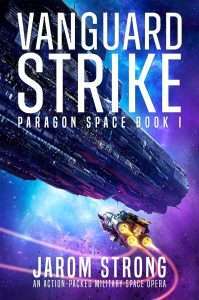 Read on Amazon
Read on Amazon

